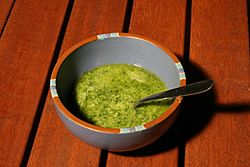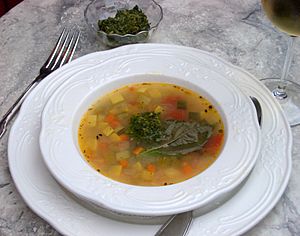Pistou facts for kids

Small serving dish of pistou
|
|
| Alternative names | Pistou sauce |
|---|---|
| Type | Sauce |
| Place of origin | France |
| Region or state | Provence |
| Serving temperature | Cold |
| Main ingredients | |
| Similar dishes | pesto |
Pistou (pronounced pee-stoo), also known as pistou sauce, is a delicious cold sauce from the Provence region in France. It is made from fresh garlic, green basil, and olive oil.
Pistou is quite similar to pesto, a famous sauce from Liguria, Italy. However, the main difference is that pistou does not traditionally include pine nuts. Some modern recipes for pistou might add grated hard cheeses like Parmesan cheese or Pecorino cheese.
What Does "Pistou" Mean?
In the local language of Provence, called Occitan, the word pistou means "pounded." This name comes from how the sauce is traditionally made. The ingredients are crushed and mixed together using a mortar and pestle, which is like a bowl and a tool for pounding.
Pistou is very similar to Genoese pesto. Pesto is usually made with garlic, basil, pine nuts, a type of cheese called Sardinian pecorino, and olive oil. All these ingredients are pounded together to make the sauce. The key thing that makes pistou different from pesto is that pistou does not have pine nuts.
How Pistou Is Used
Pistou is a popular sauce in the Provence area of France. It is most often used with a special soup called soupe au pistou. This soup is a bit like minestrone soup. It can have many vegetables in it, such as white beans, green beans, tomatoes, summer squash, potatoes, and pasta.
The pistou sauce is added to the soup right before it is served. This makes the soup taste fresh and full of flavor.
Cheese in Pistou
When making pistou, different kinds of cheese can be used depending on the region. In the city of Nice, people often use Gruyère cheese. Other areas might use Parmesan cheese or Comté cheese. In Liguria, Italy, a hard cheese made from sheep's milk, like pecorino from Sardinia or Corsica, is common.
It is important to use a cheese that does not become "stringy" when it melts. This way, when the cheese is added to a hot dish like soupe au pistou, it melts smoothly into the soup instead of forming long, stretchy strands.
See also
 In Spanish: Pistou para niños
In Spanish: Pistou para niños
 | Georgia Louise Harris Brown |
 | Julian Abele |
 | Norma Merrick Sklarek |
 | William Sidney Pittman |


